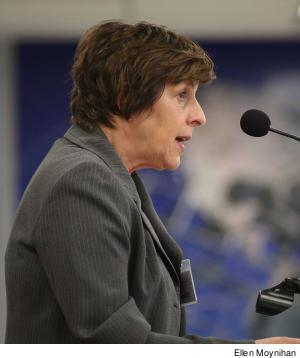Bronx Community College Associate Professor of History Katherine Culkin was worried about a student who had shown promise at the beginning of a semester but after a few weeks began falling asleep in class regularly. The student later confided in Culkin that she had unexpected health issues that caused her to be constantly exhausted. With Culkin’s extra help, the student was able to pass the class and get back on track to graduate.
For Culkin, this is an example of why CUNY instructors need a reduced teaching load. “With a reduced teaching load, I would have a better sense of my students, allowing me to recognize when they might need help even with less overt signs,” she said in testimony on April 20 to the CUNY Board of Trustees.
This was the latest push by rank-and-file, full-time instructors to urge the city to include a $35 million increase to CUNY in the upcoming budget to bring the full-time faculty teaching load in line with that of peer institutions, for the purpose of allowing more one-on-one time between teachers and students.
TIME FOR RESEARCH
 |
Beverly Horowitz, an associate professor of occupational therapy at York College, noted that her heavy teaching load has made it challenging to both work with her students individually while also addressing her out-of-class professional obligations such as doing research or serving on campus committees.
“While I have conducted several research studies since joining the occupational therapy department, [competing for] several projects was made possible due to a reduction in teaching responsibilities as I prepared for tenure,” she said. “Now that my teaching responsibilities include 21 contact hours as per contract, [in addition to] writing grant proposals, conducting research, writing articles for publication and writing proposals for submission for academic conference presentations is very challenging, often impossible.”
Horowitz said that while the department boasted excellent students and a 100 percent passing rate on the state’s licensure exams, CUNY was a unique place that requires student-focused attention from instructors. “We have numbers of nontraditional students who support children and families, students who are caregivers for ill and disabled relatives, many students are the first in their family to attend college, and many have limited supports at home,” she said. “Ongoing faculty advisement until graduation and academic support from the full-time faculty is key to the success of our program and is important for the success of all CUNY students.”
MORE ATTENTION
The testimonies from PSC members to the board came after dozens of instructors testified in support of the workload reduction to the city council’s higher education committee. See the April 2017 issue of Clarion for those testimonies.
LaGuardia Community College Lecturer Fern Luskin said, “If I were required to teach only eight courses a year, one of the biggest benefits for my students would be that it would afford me more time to teach them how to organize their thoughts and achieve flow from one paragraph to the next in their writing. A reduction in my course load would also give me more time to look over their notebooks to make sure they have written down all the important points I presented to them in class. I have found that both these strategies help students write better papers and do better on their exams, but it is very time intensive, especially for instructors who have large classes of 35 students.”
Queens College PSC Chapter Chair David Gerwin spoke about how the current full-time faculty are spread too thin, doing administrative tasks and fulfilling other obligations, robbing them of time that could be spent with students, speaking to the need of a course load reduction and the hiring of more more full-time faculty. “We’d be able to get me…back into the schools supervising student teachers. When we have these relationships, powerful collaborations develop.”

